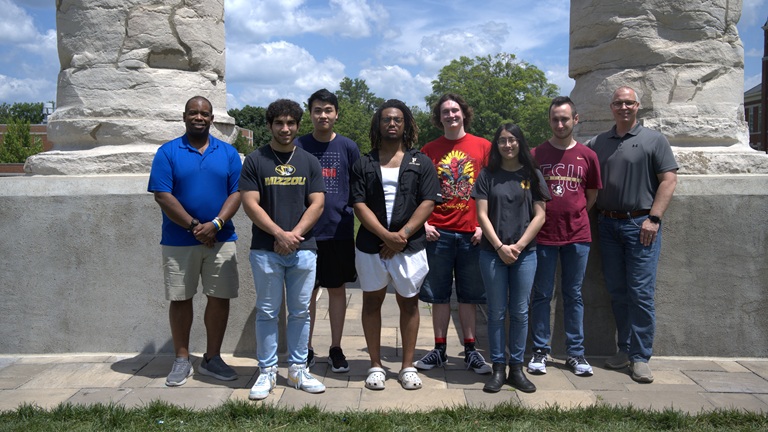August 13, 2025
Summer research experience provided participants with opportunities to make a real-world impact.

At Mizzou Engineering, we encourage students to look toward the horizon. Focusing on the future gives them the creative audacity to build new solutions.
This summer, six outstanding undergraduate students from across the country gathered at Mizzou Engineering to explore emerging research in materials science through the Creative Approaches to Materials Design and Processing Research Experience for Undergraduates (REU).
The program is currently applying to the National Science Foundation for renewal of its funding — an effort reflective of its ongoing impact and success.
“This work is important for both engineers and non-engineers because of how the research will inform policy and translate to medicine, health care and other educational avenues,” said Reginald Rogers, associate professor in the Department of Chemical and Biomedical Engineering who led the REU along with Matthew Maschmann, an associate professor in the Department of Mechanical and Aerospace Engineering.
Participants gained technical skills as well as opportunities to collaborate with other researchers and think deeply about where materials science is headed.
This summer’s cohort was selected from a competitive pool of applicants from different areas and backgrounds. Projects spanned from bioelectronics and nanomaterials to electrochemical gas sensing and machine learning.
Immanuel Cutler, a junior chemical engineering major at Virginia Tech, planned to apply the knowledge he gained at Mizzou to a new project back home.
“My biggest goals for the summer were to take full advantage of being somewhere I’ve never been, learn from the people I meet, and use my time to grow as both a researcher and person,” he said.
Bethany Eppinger studies materials science at Purdue University but hails from Columbia.
“I jumped at the opportunity to be close to home while also doing research within my field of study,” she said.
Over the summer, Eppinger used a high-precision 3D printing technique called two-photon polymerization (TPP) to build nanoscale arrays for use in making advanced electronic devices.
“I wanted to learn more about the TPP fabrication process and its applications in nanomaterials, as well as the process of iterative design in a more independent research project,” she said.
Dennis Li, a junior chemical engineering major at the University of California-Berkeley, investigated how machine learning can be used to help ionic liquid electrochemical gas sensors classify and quantify chemicals in the air.
“I am fascinated by the impact material properties have on electrochemical systems such as batteries and sensors,” he said. “This REU offered an opportunity to further explore these relationships between material science and engineering applications.”
Andrew Nault, a senior chemistry major at Florida State University, worked on carbon aerogels for filtration, studying their reuse potential.
“I chose this REU for all the opportunities it provided. I get to travel, live in a different state, and work and network with a lot of people,” he said. “Most importantly I get to see what other fields are like and expand my knowledge of what out there.”
Beyond research, students benefited from close mentorship, exposure to cross-disciplinary methods and the opportunity to develop as scholars and scientists in a supportive environment.
“We are providing students opportunities to see the future of science and engineering,” Rogers said. “At the same time, they are giving us insight into knowledge that we may not have based on our understanding of current systems.”
At Mizzou, knowledge demands curiosity. Learn more about undergraduate research at Mizzou Engineering.